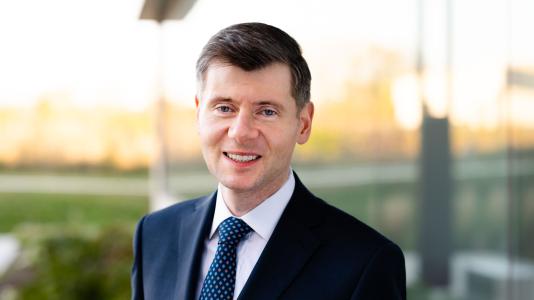
Quantum computing is a young field, so it seems fitting that a young researcher in that discipline has recently garnered a major award for his leadership and accomplishments.
Quantum computer scientist Martin Suchara of the U.S. Department of Energy’s (DOE) Argonne National Laboratory has been named to Crain’s Chicago Business’s “40 Under 40,” an annual list of Chicago-area leaders who have made unique and lasting contributions in their careers.
Suchara currently serves as a research lead in the Argonne-hosted Q-NEXT research center, one of five National Quantum Information Science Research Centers funded by DOE to develop next-generation quantum technologies. Q-NEXT particularly concentrates on developing technologies and creating supply chains to enable quantum communication, sensing and computing.
As head of the Q-NEXT Simulation and Systems Thrust, Suchara directs the research of 20 senior investigators consisting of scientists and professors at three DOE national laboratories, four universities and two technology companies. The team is performing complex materials science calculations and developing communication and sensing protocols.
“By recognizing what Martin has already accomplished, this award also looks forward to the potential of Argonne’s quantum research to advance American prosperity and security,” said Argonne Laboratory Director Paul Kearns.
Much of Suchara’s work focuses on quantum communication and computing. “Both of these areas enable a range of new applications, including the ability to communicate securely and solve difficult computational problems faster,” he said.
Suchara’s work frequently uses high performance classical supercomputers to faithfully simulate the behavior of quantum systems of a few dozen qubits — the basic unit of quantum information.
One of Suchara’s most recent contributions is the open-source quantum network simulator SeQUeNCe, which he developed to allow the evaluation of new network devices and protocols. Since its introduction in 2020, the simulator has been used to help develop a new quantum network protocol prototype that controls a quantum network testbed at the University of Chicago.
“The impact of quantum research on many aspects of science will only continue to grow, and I am excited to be a part of this revolution,” Suchara said. “The potential for new quantum technology discoveries is unlimited.”
Argonne National Laboratory seeks solutions to pressing national problems in science and technology. The nation’s first national laboratory, Argonne conducts leading-edge basic and applied scientific research in virtually every scientific discipline. Argonne researchers work closely with researchers from hundreds of companies, universities, and federal, state and municipal agencies to help them solve their specific problems, advance America’s scientific leadership and prepare the nation for a better future. With employees from more than 60 nations, Argonne is managed by UChicago Argonne, LLC for the U.S. Department of Energy’s Office of Science.
The U.S. Department of Energy’s Office of Science is the single largest supporter of basic research in the physical sciences in the United States and is working to address some of the most pressing challenges of our time. For more information, visit https://energy.gov/science.